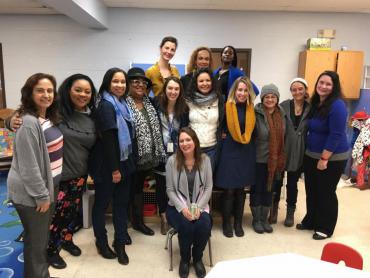Organizations Host Breastfeeding Equity Open House to Highlight Breastfeeding Resources
Even though there are many benefits to breastfeeding, families of color in Dane County still experience inequities in starting and continuing to breastfeed. That’s why, following Black Maternal and Child Health Week, Public Health Madison & Dane County (PHMDC), Harambee Village Doulas, African American Breastfeeding Alliance (AABA), Centro Hispano, and Roots4Change are hosting a Breastfeeding Equity Open House to promote their resources and show support for breastfeeding in Dane County.
The Breastfeeding Equity Open House will be at the Atrium Community Room at 2300 S. Park St on Friday, April 19th from 11 am to 2 pm. There will be speakers briefly at noon including Wisconsin State Representative (D-Madison) Shelia Stubbs. The event is open to the public and people can drop in at any time. Refreshments, activities, and information will be provided.
“Breastfeeding provides so many benefits to families, from reduced risk of chronic disease for the baby, protection against infections for both mom and baby, to money saved from not having to buy formula. It’s a powerful tool for families,” says Katarina Grande, the Maternal and Child Health (MCH) supervisor at PHMDC.
Despite known benefits, some families are less likely to start and continue breastfeeding. Structural racism, lack of social support, problems pumping at work, and other factors impact breastfeeding rates across racial and age groups in Dane County. For these reasons many partners are working to reduce breastfeeding disparities.
Each agency hosting the open house offers something a little different to our community. For PHMDC, it was about ending a first food desert— an area with no dedicated space for families to nurse or pump. “Last year, we looked at the area around our office on South Park St, and we found that no one actually had a public lactation room,” says Grande. “It’s a huge problem for lactating parents to not have a space to pump, especially at work; this is a common reason why parents stop breastfeeding.” In response to this first food desert, PHMDC recently installed a Mamava lactation pod in their office at 2300 S. Park St, which is available for public use and will be on display at the open house.
For Harambee Village Doulas, breastfeeding support starts before birth. “As community-based doulas, we support families during pregnancy, birth, postpartum and through early parenting,” says Tia Murray, co-founder.
“We have seen the positive outcomes of providing immediate postpartum breastfeeding support in the hospital setting, which is the most critical window for breastfeeding and lactation success,” continues Murray. Among other perinatal health services, doulas provide evidence-based breastfeeding and lactation support and education. They also support continuity of care for the breastfeeding dyad. “At Harambee, we view breastfeeding support through a socio-ecological lens and support the whole family, the community, as well as policy, environment and system changes.”
Even for families that want to breastfeed, it can be difficult to know what to do when things aren’t going right. The African American Breastfeeding Alliance offers one-on-one lactation support, support groups and education for families. “It’s a huge need for families,” says Hershey Barnett-Bridges, founder. “So many people struggle in the beginning and if they can’t get help, then they won’t continue to breastfeed—which you really want to do for the first year, if you can.”
Centro Hispano also sees a need to support families one-on-one and in response, they partner with Roots4Change, a collective of Latina community wellness workers and doulas (promotoras de salud). They provide culturally relevant health education to the Latinx community through postpartum support groups and doula services. “We work towards creating a healthier community as well as developing a Latinx allied health workforce to provide culturally relevant care within the community and the larger health care system,” says Mariela Quesada Centeno, the Maternal and Child Health Community Fellow at Centro.
“We are excited for people to attend the open house and celebrate the abundant breastfeeding resources available in our community!” says Katarina Grande, the Maternal and Child Health (MCH) supervisor at PHMDC.
Contacts
- Media Inquiries, (608) 243-0482, communications@publichealthmdc.com
